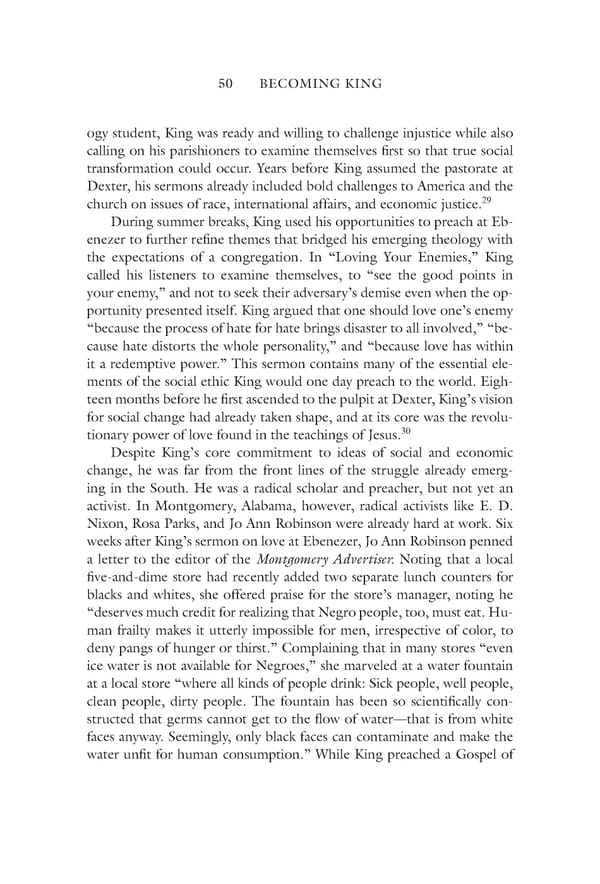50 BECOMING KING ogy student, King was ready and willing to challenge injustice while also calling on his parishioners to examine themselves first so that true social transformation could occur. Years before King assumed the pastorate at Dexter, his sermons already included bold challenges to America and the 29 church on issues of race, international affairs, and economic justice. During summer breaks, King used his opportunities to preach at Eb- enezer to further refine themes that bridged his emerging theology with the expectations of a congregation. In “Loving Your Enemies,” King called his listeners to examine themselves, to “see the good points in your enemy,” and not to seek their adversary’s demise even when the op- portunity presented itself. King argued that one should love one’s enemy “because the process of hate for hate brings disaster to all involved,” “be- cause hate distorts the whole personality,” and “because love has within it a redemptive power.” This sermon contains many of the essential ele- ments of the social ethic King would one day preach to the world. Eigh- teen months before he first ascended to the pulpit at Dexter, King’s vision for social change had already taken shape, and at its core was the revolu- 30 tionary power of love found in the teachings of Jesus. Despite King’s core commitment to ideas of social and economic change, he was far from the front lines of the struggle already emerg- ing in the South. He was a radical scholar and preacher, but not yet an activist. In Montgomery, Alabama, however, radical activists like E. D. Nixon, Rosa Parks, and Jo Ann Robinson were already hard at work. Six weeks after King’s sermon on love at Ebenezer, Jo Ann Robinson penned a letter to the editor of the Montgomery Advertiser. Noting that a local five-and-dime store had recently added two separate lunch counters for blacks and whites, she offered praise for the store’s manager, noting he “deserves much credit for realizing that Negro people, too, must eat. Hu- man frailty makes it utterly impossible for men, irrespective of color, to deny pangs of hunger or thirst.” Complaining that in many stores “even ice water is not available for Negroes,” she marveled at a water fountain at a local store “where all kinds of people drink: Sick people, well people, clean people, dirty people. The fountain has been so scientifically con- structed that germs cannot get to the flow of water—that is from white faces anyway. Seemingly, only black faces can contaminate and make the water unfit for human consumption.” While King preached a Gospel of
 Becoming King: Martin Luther King Jr. Page 70 Page 72
Becoming King: Martin Luther King Jr. Page 70 Page 72